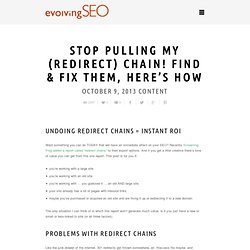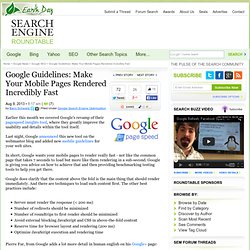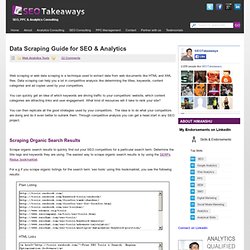

Stop Pulling My (Redirect) Chain! Find & Fix Them, Here's How. Undoing Redirect Chains = Instant ROI Want something you can do TODAY that will have an immediate effect on your SEO?

How Website Speed Actually Impacts Search Ranking. The author's posts are entirely his or her own (excluding the unlikely event of hypnosis) and may not always reflect the views of Moz.

Google uses a multitude of factors to determine how to rank search engine results. Typically, these factors are either related to the content of a webpage itself (the text, its URL, the titles and headers, etc.) or were measurements of the authenticity of the website itself (age of the domain name, number and quality of inbound links, etc.). However, in 2010, Google did something very different. Google announced website speed would begin having an impact on search ranking. Now, the speed at which someone could view the content from a search result would be a factor. Unfortunately, the exact definition of "site speed" remained open to speculation. Clearly Google is increasingly acting upon what is intuitively obvious: A poor performing website results in a poor user experience, and sites with poor user experiences deserve less promotion in search results. Google Wants Your Mobile Pages To Load In Sub-Second. Earlier this month we covered Google's revamp of their pagespeed insights tool, where they greatly improve the usability and details within the tool itself.

Last night, Google announced this new tool on the webmaster blog and added new mobile guidelines for your web sites. In short, Google wants your mobile pages to render really fast - not like the common page that takes 7 seconds to load but more like them rendering in a sub-second. Google is giving you advice on how to achieve that and then providing benchmarking testing tools to help you get there. How Website Speed Actually Impacts Search Ranking. 10 Excel Functions Every SEO Professional Should Know. Many website owners use Excel on a daily basis.

They might keep a list of backlinks they want to track, or use it to track keyword rankings. True SEO professionals know how to use Excel to maximize the value of their SEO strategy, manipulating the data in ways that shed new insights into their campaign. This article will outline my favorite tricks for doing so. A couple years ago, Ann Smarty wrote an excellent piece on using Excel for SEO, but I figured it was time for a refresher based on the many changes the industry has gone through since then. First, we’ll start with some of the basics and then move to more advanced topics. SEARCH and FIND. Data Scraping guide for SEO & Analytics. Web scraping or web data scraping is a technique used to extract data from web documents like HTML and XML files.

Data scraping can help you a lot in competitive analysis like determining the titles, keywords, content categories and ad copies used by your competitors. You can quickly get an idea of which keywords are driving traffic to your competitors’ website, which content categories are attracting links and user engagement. What kind of resources will it take to rank your site? You can then replicate all the good strategies used by your competitors. An SEO's Guide to RegEx. RegEx is not necessarily as complicated as it first seems.

What looks like an assorted mess of random characters can be over facing, but in reality it only takes a little reading to be able to use some basic Regular Expressions in your day to day work. For example, you could be using the filter box at the bottom of your Google Analytics keyword report to find keywords containing your brand, such as Distilled. If you want to include both capitalised and non-capitalised versions, you could use the Regular Expression [Dd]istilled.
Pretty simple, right? Hang on though… some of you might be asking, what the hell is RegEx? So in the example of the keyword report above, your Regular Expression is applied to each keyword and if it matches it’s included in the report. RegEx has many uses aside from Google Analytics too such as form validation or URL rewrite rules. Characters & Metacharacters I mentioned that Regular Expressions are made up of characters and metacharacters. Dot . The Open Graph protocol. How Google's Disavow Links Tool Can Remove Penalties. Can using Google’s link disavow tool help remove penalties?

Yes, the company says. But when it comes to manual penalties, disavowing links alone isn’t enough. With algorithmic penalties, there may be a time delay involved. Below, more about how both methods work. Over the past few days, I’ve encountered a couple of cases where people are confused about how the link disavow tool works to remove penalties.
Disavowing Links: “Don’t Count These Votes!” If you submit a disavow request, Google will automatically process that request and tag those links pointing at your site in the same manner as if they had the nofollow tag on them, in other words, as if they aren’t actually pointing at your site for link counting and analysis purposes. This is something that came up again in a Google Webmaster Central hangout video yesterday: This all happens automatically, and Google says it still takes several weeks until the disavow request is processed. A Data-Centric Approach To Identifying 404 Pages Worth Saving. A critical part of doing a site or link audit is checking to see how many 404 (page not found) pages there are in a site.

I can’t tell you how many times I’ve seen an audit that lists the total number of 404 pages and advises developers to find appropriate pages to redirect these 404 pages to. That’s no big deal if we’re talking about just 20 to 30 pages. But, when a site has 404 pages in the thousands, and you tell the developers to fix these pages, you’re going to look more than a little ridiculous. The SEO Guide To Getting Started With Google Webmaster Tools. XML Sitemaps: Guidelines on Their Use. The author's posts are entirely his or her own (excluding the unlikely event of hypnosis) and may not always reflect the views of Moz.

Over the past couple of days I have been putting together some internal guidelines on various aspects of our jobs. This should ensure that we are giving consistent information to our various clients. Most of these guidelines have been fairly straightforward with nothing in them to write home about. However, one of the hardest guidelines to write has been the one talking about xml sitemaps.
18 Meta Tags Every Webpage Should Have in 2013. The definitive guide to Search and Social Meta Tags you should be using in 2013.

No fluff, no wasted code, just what you need to use.